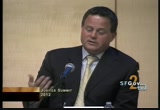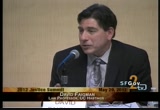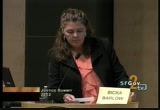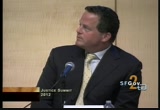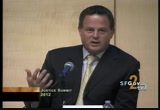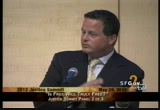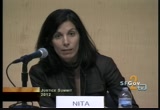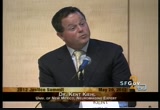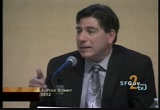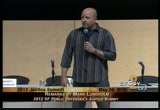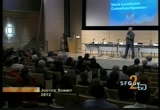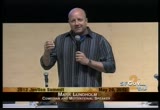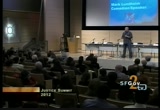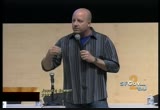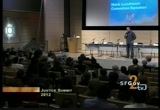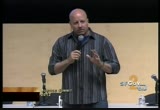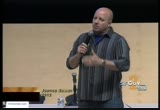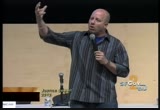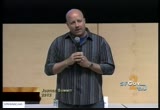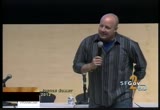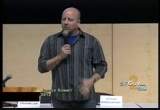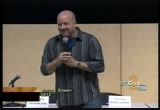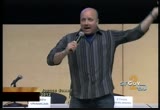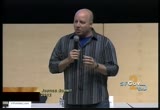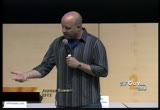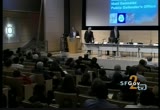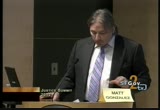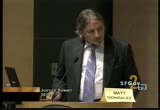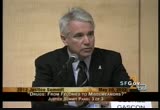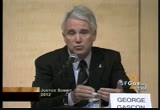tv [untitled] September 9, 2012 8:30am-9:00am PDT
8:30 am
so i have not obviously testified to anything like that. i just tried to give that as an example. there is an enormous literature out there that is already peer-reviewed and published on i.q. there are dozens of papers. the big question is how well can i take a single person's brain scan and with what confidence can i get a number associated with it that we would derive an i.q. those measures and ways that we do that get better every month, basically, every year we're getting more and more accurate at taking a single piece of information or complex piece of information and fitting it. to my knowledge, it hasn't been done. i am aware there are patents on estimating i.q. using brain imaging which is a measure of metabolites in the brain. i haven't actually -- i'm not aware of any cases in which it's been used. there is no reason why it couldn't be. >> the way it's been, nothing as you have described with the
8:31 am
algorithms to map it has been used. brain imaging has been used to try to bolster a claim of lower i.q., not by an algorithm, but by showing brain abnormalities and other things that could be consistent with mental retardation and lower i.q.. >> i would add to that, this is an area that a partnership between the lawyers and the scientists could make a difference. i teach constitutional law. the question i ask is, why is low i.q. an excusing condition from the death penalty? if you go back to atkins and read the opinion, it's on the basis of an eighth amendment analysis of the twin pillars of the criminal law which are retribution and deterrence. the court makes the judgment that low i.q. means that you're less responsible and less likely able to be deterred. so the twin pillars of the criminal law don't really apply. but i'm not sure that the psychologists who do psychological testing and i.q.
8:32 am
or the neuroscientists have really connected up the constitutional reasons why because it may be that they're substructures of i.q. that are more relevant to the eighth amendment question. it's not a general i.q. score that is ultimately relevant. in fact, the california supreme court has dealt with exactly that question of what subscales might be constitutional relevant rather than the global i.q. score. >> one question here which i think is very interesting. in my community, we strongly feel that diet plays a strong diagnosis of the violence we see, the intake of sugar which is heavily consumed is a factor. what is your take on that? >> diet certainly plays a role in controlling and behavior. you know, i'm not that familiar with all of the different science associated with different dietary restrictions and other types of things. you can certainly reduce the instance of aggression in animal models by putting them on different diets.
8:33 am
you can make them more likely to be aggressive, for example, by changing diets. i have a sister who is a nutritionist around the corner. she would kill me if i didn't tell you to eat right, you know. [laughter] >> that being said, i do believe that deficits in certain essential aminnow acids and other types of things can certainly increase people's impulsivity. they can increase people's chances of not -- of those types of things, yeah. >> and one final question and i'm going to rephrase it a little bit, but why is it that we treat people who have, say, traumatic brain injuries or other diagnosed mental illnesses in the criminal justice system rather than in the mental health system? [applause] >> so what i showed you today was to give you that exact what is neuroscience doing in the legal is system and so that person of the person with the
8:34 am
tumor, you could all see that and so can a radiologist. but the else that we do know of those images. no radiologist can just see by looking at them. we are so sensitive to individual differences in i.q., in age, in all of these different availables, psychopathy scores, whatever it is, we can develop beautiful pictures of these things. so the question is, how is the legal system going to deal with all of these different, you know, images and other types of things that we can now tell you about your brain and how is that going to change things? so i tend to view, you know, individuals who have brain differences for whatever reason worthy of developing better treatments for them that can help to remediate those problems. as psychologists, we study abnormal behavior. anita shows distribution, most of us in here. you get anybody out here who is externalizing or anyone out here who is internalizing, as a psychologist, we try to bring them back in here so they're more healthy. that's what we study.
8:35 am
when you're having problems in your life or any other area, if we can do something, talking to you versus talk therapy or medicine that might help you, what we're trying to do is get everybody back here so we're just kind of more balanced. with respect to the traumatic brain injuries and other types of things, that's much simpler for people to kind of understand that you had a concussive event or you had a t.b.i., traumatic brain injury, that's caused problems. we should be developing ways of helping to manage and treat those problems just like we do individuals who have the other types of problems. >> let me just add one thing there, which is it's a good question, but it highlights one of the challenges of introducing neuroscience today in the courtroom. at kent showed you some of his slides and mentioned during his talk, he is trying to develop treatments as he develops abilities to diagnose psychopathy. but that's what comes first is the diagnosis. if that is what is introduced first before there are any treatments available, which is the status of much of the
8:36 am
neuroscience today, then there isn't a treatment that is available. and so part of the problem today is it tends to serve as an aggravating factor because you can't say, well, here is a simple way to fix that thing that we have identified. in a few cases where defends have been able to show that they have been successfully treated, like, for example, if they were unaware that they had intermittent explosive disorder and it could be treated with an anti-depressant, an ssri because of their low seratonin levels for example and they showed that their behavior has changed since they have been in prison awaiting trial but after conviction and appealing a death sentence, in those cases it had more traction. it makes sense we should focus on treatment, but as a cautionary tale, if it is introduced before treatment is available, how are juries likely to receive that information? they're likely to receive it as a person saying i am somebody who was programmed to be
8:37 am
violent. there is no solution for my particular ailment. so there is a disconnect in the neuroscience given the timing. >> so i would just comment that i think we have pretty decent treatments for remediating some of the most intractable individuals. they're not used around the world, et cetera, and many countries take individuals who have done very bad things as youth and have developed management and treatment strategies that keep them from reoffending when they're out in the community. they're much more man yearly. there is much more supervision than we typically get in the united states. it's usually much more cost-effective to manage them outside of a facility with high scrutiny than it is to incarcerate. as you probably know, california spends about eight times as much money for every inmate as it does for every student in the university of california system. and so you could reorganize those resources and put they will more towards supervision and other types of things and
8:38 am
manage a lot of those individuals that are currently incarcerated in a much more effective way that is going to save you tax dollars but also reduce the chance that they'll continue to spiral into those, like the stories we heard earlier today. [applause] >> if i could add one quick thought that ties with the first panel and this panel. it's the question of resource allocation. the point needs to be taken quite seriously especially with adolescents. if you get the diagnosis and the community is not ready to step up and do the interventions that are more humane, then the inhumane alternatives may end up costing more but being the easy political solution. >> i think we're out of time. i would like to thank everyone on the panel for their time.. >> thank you kindly. as an ex-felon, it's not my
8:39 am
first effort with a public defender in public for a bunch of people who i know are working hard to make this substance abuse incarceration cognitive behavior thing work all together. i started doing my career in rehabs and jails and shelters and where i live. it's a privilege to work for people who chose to be the audience. oddly enough, they don't get that in the jails and prisons as a joke, really. they don't, i have been sober 23 years and incarcerated in a lot of the 1980's -- [applause] >> thanks, listen, i hope some day we reach a point where that's not necessary to applaud for. i really do. 23 years sober means that i have run out of excuses to misbehave. that's all it means. i'm criminal by nature. i'm challenged by generically designed. i'm a comedian by trade. i love the effort that it takes to make this disease, alcoholism addiction co-dependency, the trifecta of
8:40 am
dysfunction that comes from a family source that's really nothing to make fun of. i make a living during humor about a disease that kills more people than car accidents, cancer and war combined, over 92% of incarcerated individuals have a drug or alcohol history or a thread in their family. i'm one of those kids, oldest of five kids in a very dysfunctional family. a.d.d. in our house stood for all different dads. [laughter] >> normal people don't laugh at that at all. they don't laugh at that at all. i get a huge response from that from the people who are the affected, the afflicted, the convicted part. there are two groups of people here. it's not black or white, or gay or straight or tall or short. this disease, is substance abuse could care less how you entered it, finance, romance, circumstances, glance, it doesn't care how you got here. the two groups of people i depreas every time i go to work are normal people and the rest
8:41 am
of us. normal people don't giggle right there. normal people always go, oh, there is another group. welcome, how y'all doing? the rest of us go, that's us right there. now, if you're wondering which group you're in, you're normal. the rest of us have known for a lot of years not normal. normal means most. most people don't drink and drive because it's illegal. they wear a seat belt because it's safe. they don't slap their kid and tell them that's because they love them and that's the way we show them. ok, there might be three groups of people in this room. normal, the rest of us and not getting any better anytime soon. the threat here is lesson. the shame is removed. the stigma is replaced, we go from dope to hope here at some point. we go from drinking and singing and lying and dying to staying and playing and praying and living and giving. that's what we get to do. i'm an incarcerated guy. incarceration was not the same as rehabilitation for me.
8:42 am
it just wasn't the same. but i have been over 500 jails and prisons in 23 years. i speak nine languages now. they're all english, but i speak fortune 500. i speak corporate, i speak kid. i have a 5-year-old. he is safe all day in the home that i have created, not the one i grew up in. my wife is an afflicted convicted lady. she actually did more jail time than i did she has seniority at home. [laughter] >> normal people don't laugh right there at all. don't the wives only have seniority? yes, especially in the penal system. but that was a double-edged sword there, i hope you got it. some of your pot smokers or ex-pot smokers, the jokes won't kick in for a long time. marijuana retards the ha ha muscle. three months from now somebody will go they're all different dads. sorry, your honor, i apologize, i wasn't laughing at you.
8:43 am
[laughter] >> the concept here of humor as a basis for approaching a topic that is awkward to discuss has never been a mystery to us. the art of that is sometimes awkward, especially on a public level because there is a risk, god bless jeff who took a risk. i called him on friday, i heard a radio ad, i said, hey, i can help on tuesday. i love what i get to do now. i work for everybody i choose to. i turn down more work for speaking in comedy than more people in those industries can ask to do in a year. i'm designed to do this. trauma, drama, aapplicanted, addicted mama, that all leads to a shield for a accepts of humor -- sense of humor that provides balance in unfairness. i just made a living doing it because it allowed me to keep on living doing it. my dad would crush you at our house so hard that you would
8:44 am
black out. and then he was offended you couldn't stick around for the full beating. i'm not the dad i had. my son is not the boy i was. because people like you have allowed me to become the man i am. he gets to be the child he wants to be. now just saying that in public, child of god, somebody is going to write an email. separation, church and state, got god bless you. you didn't hire me. shut up! that's a joke. let it go. the big deal today from jeff was, he goes, just try not to get the city sued when you're done. just do that. [laughter] >> that was the big focus. i don't care if they laugh. i just don't want to deal with all of the paperwork. humor has a way of highlighting hurt, illuminating illness. it does that on its own. comedy has a way of pointing out where we're fractured or brittle or inflexible or intolerant. comedy does that. so today during the 12 minutes
8:45 am
i'm up here, if you don't laugh, it's not because i wasn't funny. it's because you are broken somewhere. that happens all over the planet. my disease is cognitive behavior thing you talked about this morning, or lessening the felony con fiction to a misdemeanor conviction thing, that's all good. the addict that you deal with, the criminals, addicted criminal is a little redundant anyway. addicted criminal is like saying intelligent criminal. i always tell the incarcerated population, criminal doesn't mean wrong. criminal means caught. they laugh hard at that right there because they know they got caught and then i'll remind them that if you have a sense of humor if balances unfairness. if life is fair -- one for the normal and one for the rest. normal people hear the word tweak, it means enhance something. normal people see d.o.c., it's short for document. not department of corrections or drug of choice which go
8:46 am
together at some point. normal people don't have silverware drawer at home where the response are burned on the bottom. burned spoons, don't they have pots and pans to cook their food. they must eat small portions of top ramen. yeah, if that. if life was fair, teachers in this country would get made -- paid $1 million a year and professional athletes would work for tips. if life was fair, children wouldn't be born h.i.v. positive or missing limbs and they would all have the same advantage economically, socially, parentally. if life was fair, i wouldn't visit a prison on a sunday afternoon and talk to a general population of 500 or 600 and walk through the lobby and see children waiting to go through the metal detector and the look on their faces and they are already used to it. that's a felony. it's no big deal for a 6-year-old to walk through a
8:47 am
metal detector to visit their parents. that has to stop. now, for the normal people, if life was fair, your property would still be worth what it was four years ago. that's one of the rest of us clap. my landlord, screw him, we don't care if life was fair, when the copses tossed your apartment serving the warrant, they would put everything back exactly where it was when they got there. this disease doesn't care what group. it's more open-minded than the people that have it. a lot of times when one of us makes the ultimate mistake, we forget who we are and think for five seconds and it costs someone else the rest of their life. this disease kills people who don't even have it. it's so open-minded, it says come on, addicted, afflicted, community, recidivism. why wouldn't we do that growing up in the houses that we did. i'm not making an excuse. i'm telling you that's how it starts. my disease has nothing to do
8:48 am
with heroin which was comforting or marijuana which was artificial intelligence at some point or cocaine which was necessary if you had a job in the 1980's. . alcohol which put out the flame of shame for a 5-year-old abused boy, why wouldn't i drink? well, those substances are gone, but i realize at some point, this disease is not about substance abuse, it's abuse of self-sense. i was giving substance as a very small kid to develop. so i'll tell the incarcerated people, if you get out of here and never come back to a place like this and don't tell the young people how to never go to a place like this, you're still a thief. i owe people. that's why i go to talk to people. but my disease is first off wrong, theirs guaranteed wrong. made that way was i. first thought wrong, inappropriate, impolite, incorrect, cruel, criminal, abusive, petty, angry, poor,
8:49 am
first thought wrong, absolutely. first thought wrong. 12 minutes, that's what i get? 12? second thought was i'll take two and make a difference. first thought wrong, sometimes second thought wrong grr! sometimes it takes me 15 minutes to get to a healthy thought. sometimes longer. sometimes four days of long, wrong, and strong. i went through t.s.a. recently in san jose where i live. i was born and raised in oakland, i went to jail in livermore. here is the part. normal people don't laugh at jail there. i worked there. god bless you if you worked there. i couldn't do that job for two days in a row. i can do it for an hour. an ex-felon who is an extraordinary father. i can become an ex-drunk who is an exceptional citizen. there is a transition necessary for a convicted, afflicted
8:50 am
person the and it involves payback. i owe so i go. but i'll tell the incarcerated, hey, if life was fair, you wouldn't be in here right now. you would have parents that cared and gave you the road map to success and they stuck around. they didn't hurt you on wait. they go yeah. if life was fair, you wouldn't have been busted when your partner wasn't. yeah. they love that one a lot. and then i'll say this well, if they locked you up for everything you really did do criminally, when would you get out? they don't like that one at all. so i'm blessed to be here for a brief period of time this afternoon and i'll tell you this, the first thought wrong is my problem. i was flying out of san jose airport which i do about 200 times a year and i know everybody there. i have been flying out of there 15 years and the t.s.a. guy was new. new people hop. they don't stand still. new people. i don't care if it's a starbucks employee, which i love starbucks! i make my coffee like fudge. you have coffee with me in the
8:51 am
morning, here, you want a piece? [laughter] well, that's good, isn't it? wow. normal people drink decaffeinated coffee. what the -- no, decaffeinated coffee. that's like a hooker who won't do it! can't call it that anymore, right? normal people don't clap for that, sir. [laughter] my first thought is wrong, i can't share it with you. that's how wrong it is. i'll move to the show i wrote. i go through security at t.s.a. and they hop, a hotel desk employee, a politician, they go like this. economy of movement. that's their deal. traffic cop. been on the force a long time. new guy. the old veteran is going, dude,
8:52 am
you'll wear out. it will take about two years and you'll want to retire. that's what happens. this t.s.a. kid, he's new, he goes like this. it's my turn to come through the metal detector, he's doing this. my first thought is that's a little overdone. this works. that's fine. i come through and i'm giggling, first thought wrong. it's quarter to 6:00 in the morning. something's funny? yeah. about i can't tell you what it is. he said, you've been selected for a special screening. i said, i've been chosen! you ever watch a homophobe's eyes roll back into his skull? that mental reset of the computer just blinks. i need male assist on two, please. i need a male assist on two. i don't care. this disease doesn't care, the criminal justice system doesn't care. g.o.d. doesn't care,
8:53 am
heterosexual, you're perfect, bisexual, you're greedy, life is a buffet for you every day. i'll take one of him, two of her and all that big fella, come on! barbecue in my back yard, let's go! so i step over to the special screening area and the kid comes over because the senior security guy says you go frisk him and he went -- first thought, wrong. i know i have leverage here. humor will make awkward turn into experience. now, the danger is humor is a bighammer. i'm not funny all day. because at some point if all you have is a hammer, everything looks like a nail. it's the wrong tool for the right way to do something, so try to balance it. but i was out of sorts, hadn't had my coffee and was a little tired. he comes over and said i have to give you a special patdown
8:54 am
with the back of my hand. i said use all 10 fingers, i'll buy you breakfast. checkpoint, security, two. i survived the situation, got on the plane. the point is this, that what's in my head i've never had to apologize for. first thought wrong properly filtered was some kind of rehabilitation or education or part of the c.o. or the p.d. or the d.a., helps first thought wrong become next right thing. you can do it. i can teach the incarcerated population what to want because they always get what they wanted. they wanted more, they got more. they got it, they got it. they want someday, they left with none. they wanted her or him, they got that. i can tell them what to want now. pass first thought wrong, what to want. they do the right work, i can show them how to keep it this
8:55 am
time. my boy's safe all day. it's not because of me. it's because of efforts like this. [applause] >> as our panelists take the stage and get seated, let me introduce our discussion. earlier this year, california state senator mark leno introduced legislation that would revise the penalty for simple drug possession under the state law, making drug possession laws that punish as a felony would now be punished as a misdemeanor. the new legislation, sb-1506, does not apply to anybody involved in selling or manufacturing drugs. the stated purpose of the bill is that it would help alleviate overcrowding in state prisons
8:56 am
and county jails, and ease pressure on california's court system and result in millions of dollars in annual savings for both state and local governments. senator mark leno who couldn't join us today as been quoted as saying, quote, there's been no evidence to suggest long prison sentences deter or limit people from abusing drugs. in fact, time behind bars and felony records often have horrible, unintended consequences for people trying to overcome addiction because they are unlikely to receive drug treatment in prison and have few job prospects and educational opportunities when they leave. this legislation will help implement public safety realignment and protect our communities by reserving prison and jail space for more serious offenders. commenting on the fact 13 other states have moved in this direction, senator leno has said, quote, in fact, the
8:57 am
experience of these other states when treating drug possession as a health issue has resulted in better public safety outcomes which can result in safer communities. george, why don't we start with you. you've dedicated post of your adult life to fighting crime and trying to make communities safer as the elected district attorney of san francisco, you've committed yourself to that, and yet you've broken away from the position held by, i believe, every other elected district attorney in california to support marar district attorney in califoia to support senator leno's direction. why is that? >> i want to thank marty for being here. even though we disagree, i think it was really important to have the point of view of the 57 other elected d.a.'s in the state. i think it's important to understand in our dialogue so marty, thank you for being here. >> thank you. >> marty is someone i respect a great deal and he has been
8:58 am
involved in public safety for a number of years and doing very momably serving the l.a. city attorney as well as his current position. actually, for me this has been a journey, it's not like a light switch went on yesterday. i have been involved in public safety for about 30 years. i have seen the war on drugs from the ground up. i have seen it as a police officer, young police officer walking, foot beat in south central and east l.a. i saw the revolving door, the impact that that revolving door was having in many communities and as i rose through the ranks, i began to take a different look at the way we dealt with crime and the way we dealt with public safety and as i evolved throughout the years, i came to the conclusion that what we had been doing with the war on drugs was leading us in the wrong direction.
8:59 am
the impact that it had and not only in communities -- quite frankly in our entire community was creating a situation which doesn't necessarily make us any safer and frankly, i think we have criminalized an area i think should be really looked upon as a health issue more than as a criminal issue, and i think consequently, a lot of the solutions we have tried in the last 2 1/2 decades have taken us to a place where today we cannot afford it economically. i can tell you that socially we have been broken for many years, but now the economic peace of it has come to play and that's probably why, quite frankly, we are reacting. i think we can deal with being socially bankrupt much easier than we can deal with being economically bankrupt. i think now we've come to the point where there's an intersection between the two. having said that, i also think it's important
114 Views
IN COLLECTIONS
SFGTV2: San Francisco Government Television Television Archive
Television Archive  Television Archive News Search Service
Television Archive News Search Service 
Uploaded by TV Archive on

 Live Music Archive
Live Music Archive Librivox Free Audio
Librivox Free Audio Metropolitan Museum
Metropolitan Museum Cleveland Museum of Art
Cleveland Museum of Art Internet Arcade
Internet Arcade Console Living Room
Console Living Room Books to Borrow
Books to Borrow Open Library
Open Library TV News
TV News Understanding 9/11
Understanding 9/11